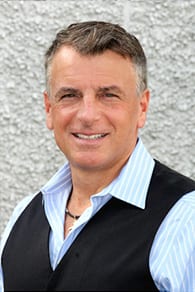
Good News conducted an interview with Stephan Tchividjian on Friday morning, February 23, 2018, two days after the passing of his grandfather, The Reverend William “Billy” Graham. Stephan is the oldest grandchild of Billy Graham and president of the National Christian Foundation-South Florida, and sits on many Christian and philanthropic Boards; a list of significant length.
We sincerely thank Stephan Tchividjian for exclusively sharing his most intimate memories with the readers of the Good News – LJF.
The “Real” Billy Graham
Good News – People can read about Billy Graham in his bio, but what we want to know from you is… He’s your grandfather. Who’s the real Billy Graham in private life and around family?
Stephan Tchividjian – That’s a good question and one of the things that I would say without any hesitation is he was always the same in private as he was in public, meaning that there was just a genuine humility. He was always more interested in you than you may have been in him. He was authentic. I never saw something in private that didn’t reconcile with his public life. So that was something that was very impressionable upon me was that he was just a real person. Now he was a real person in the sense that there were times he would be in a bad mood about something. There were times when he was pessimistic about something or concerned about something just like all of us are, so there was a reality to who he was as a person. He wasn’t this overtly super spiritual person that you sort of felt like had a halo around his head. At the same time he never told a dirty joke, never said anything negative about anybody even if you tried to get him to say something negative. I never experienced that. He was always true to what he believed.
We Call Him “Daddy Bill”
GN – How old were you when you realized he was a big deal?
ST – That’s a great question. I just grew up in it. The way I’ve compared it is sometimes if you were born into money for example. If you were born into a family of great wealth and you asked when did you realize you had wealth, the person would say I’ve always had it. It wasn’t like I knew not to have it. So it wasn’t like he was not a famous guy and then all of a sudden became a famous guy and it was like, we always knew him. We call him Daddy Bill, but we always knew Daddy Bill as a preacher who had all these cool friends. As little kids I don’t think we probably appreciated the various people that we got to meet or be around because of who my grandfather is. I don’t think it was until later on when we had a deeper understanding of that. But for me it was always. I’m the oldest, the first grandchild. For me it was just a constant.
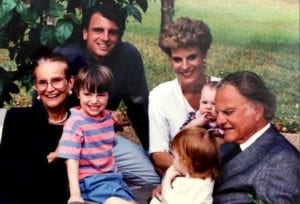
Humility and Pessimism
GN – Take a moment to think. What was the one thing or the things that the public never saw about Billy Graham.
ST – I don’t think they ever saw the extent of his humility. I mean he did not go around thinking he was a big deal. I would see that in the way he would treat a taxi cab driver or a waiter or a waitress. The way he would have a conversation with someone in an elevator. I mean he was genuine. He didn’t walk around with some big posse and wanted special treatment everywhere. I mean when I grew up he bought his suits a Sears, usually drove a Ford, just a normal car. He didn’t have fancy cars. His house was normal. So I think that even though they recognized him as this incredible, old influential leader, I just think they didn’t know how his private life was. It wasn’t until much later on, he mostly for health reasons would fly private. And that was mostly because he would have a friend who would say, I have a plane I’m going to lend it to you. He wasn’t this guy who this was his MO. So I think they just didn’t see the extent of his humility.
And I think another thing people didn’t always see was he could be pessimistic sometimes. In other words if there was a big meeting he was holding and it was an outdoor meeting and he woke up that morning and looked out the window and saw a cloud on the horizon, he would be convinced within a few minutes that the cloud was going to develop into a storm and it was going to ruin the meeting and no one was going to come that night. Or if he had a headaches, he was convinced it was a brain tumor and he would die. So it was that side of him because people always saw him as this great, strong, powerful preacher. He never moved away from a deep understanding of I’m a sinner just like everyone else. He did not think he was better than anybody. He did not think that he was holier than anybody. He would often quote and just say, I am such a wicked sinner. I mean I am just a sinner like everybody else, so he was just… he just had that side of him that I think people sometimes overlook or didn’t see unless they spent some time with him.
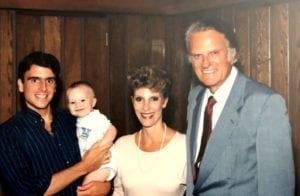
Growing Up With Grandpa Billy
GN – When growing up with your mother, what is something she may have said about her dad, Billy Graham, that shocked or surprised you?
ST – That shocked or surprised me…hmmm. I don’t think there was ever anything she would have said about him that shocked or surprised me either in the negative or the positive… certainly not in the negative. In the positive I just think there was just such a consistency with my grandfather and his life. I think that’s not really answering your question, but one thing that my grandfather would say and I think some of the children would concur was that if he had a regret, the regret would be that he didn’t spend as much time with the family as he needed to. Too much travel, too many meetings, those kinds of things. Especially in those early on years there were big moments where he was gone for sometimes months at a time, and that wasn’t really shocking or new, but I do know that he regretted it, and I think the family missed it as well.
Got Car?
GN – Did he drive his own car?
ST – Yes, as far as what I remember he did. Of course, when he got older… He didn’t do much driving anyway because when he traveled he was always in some cab or going somewhere, but definitely. I’m trying to remember. I think they always had Fords I think. Just normal cars. Just a regular sedan.
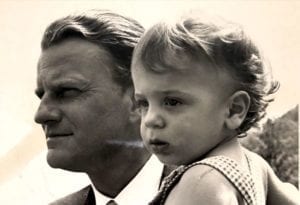
Football and Fishing
GN – Did he ever take kids fishing or throw a football or play with them?
ST – Yea… Again when he was younger, I was the oldest so I got to enjoy him in his younger years. But I have memories of taking a walk with him on the beach. I have memories of fishing with him. I have memories of just one-on-one talking time. He was always accessible, always available. One of my fondest memories was when I was about 12 years old, he decided to take each one of his grandchildren one at a time. He decided he wanted to have them come along with him to the meetings, the crusade meetings that they were called at the time. Typically, in those times, he would go to a city for upwards of maybe two weeks. The meetings lasted maybe five to seven nights, but he would go there and meet with various pastors and city leaders and dignitaries, his team, his staff. He would do that for four or five days, press. And then he would have his crusade meetings, and he would stay for a couple of days afterwards and then he would leave. So I was able to shadow him when he did that in San Diego. That was probably 40 years ago. So I was the first one who got to enjoy that experience. It was such a wonderful memory because I can honestly say not only was it fun for a kid, you know you get to meet the press people and meet the mayor and do that kind of thing, but I remember two specific things that stick out to me. One was I never saw as a young impressionable 12-year-old boy, I never saw any inconsistencies of his private life and his public life. And you know when you hang with someone for two weeks you would think that you probably would see that at some point, but I never did. And I remember one specific moment when we did the meeting, and what he would typically do is right after the meeting, the crusade meeting in the stadium, he would get a police escort back to his hotel just because of the crowds, and he would typically stay at a Marriott Hotel, nothing particularly fancy. The reason he would stay at Marriott was Bill Marriott was a friend of his and said, you’re always welcome at our hotel and I will comp your stay. He was very gracious to him on that. So he always stayed at Marriott and he would go back to the hotel. Then he would go up to his hotel room, order room service, and again it was always just a hamburger or something pretty normal, and he would pull two or three guys together and they would debrief together. And he would say, ok talk to me about my sermon. What can I improve on tomorrow? Any thoughts on this or that? And they would debrief the meeting. Well, he included me in that debrief. And I just remember sitting there eating a hamburger or whatever I was eating, and I remember him looking at me and asking what do you think and giving me the opportunity to comment on that evening. And I think two things: one I don’t remember what I said and I hope and pray that I said nothing. Knowing me, I probably did say something. But the fact that he acknowledged me and included me, that says a lot about how he treated me as a grandchild. The way he thought of his grandchildren, the way he thought of people. And so that’s a fairly vivid and a good example of the type of grandfather. So, yes, we had our moments to fish or walk on the beach, but then there were those more profound life shaping moments as well.
Pastor to the Presidents
GN – He was known as the pastor to the presidents. And I know that it was 5 or 6 of them. And I once before asked you, did he go to the White House? My recollection was, no, they came to him.
ST – I don’t remember saying that. But, yea, he had access. There were several… It’s pretty well recorded in history that he had pretty close relationships with several of the presidents over the years. I think he was the closest to the Bush family. They would often invite him and include him in the White House. He was never one that I was aware of that ever demanded access to the White House. He was often considered sort of the pastor to the presidents or maybe in some cases a spiritual advisor or whatever. It got him in trouble once in a while. He got a little too close to Nixon, and he got into some trouble with that, of which he truly repented. I was actually speaking to a gentleman last night who had been very involved in one of my grandfather’s meetings in… I forget which city. I want to say Cleveland or Cincinnati or something like that. And it was at the same time that the Nixon tapes came out. There were recordings of my grandfather speaking with President Nixon. And President Nixon was saying some anti-Semitic remarks and my grandfather was, I don’t know the specific recording, but in essence was going along with them. And so word got out … Did you hear what Billy Graham has said with Nixon? And so my grandfather contacted this gentleman and said, “look, I want you to get all the prominent Jewish leaders in this city together.” And he said, “I do not want any press. I don’t want you to tell anybody about it. Just do it quietly.” So he did and 10-15 leaders got together and my grandfather went into that room and very humbly said, “I don’t recall these comments, but it is my voice on the tape. I am so, so sorry. That is not my heart.” And he just spent time with these influential Jewish leaders not making a press deal, not defending himself in the media, but simply recognizing and acknowledging that he got a little too close to power, a little seduced by it, and it mired his judgement. So it’s a longer context to your question about the White House, but I think there were times when he was there just to comfort a president maybe provide personal counsel on a personal issue. There are times when presidents asked access to him I think to sort of get a sense of the pulse of maybe a major issue. He was ahead of his time when it came to race relations. So I think he was always considered sort of an advisor and a personal friend to several, but at the same time he also made his mistakes being close to power.
GN – I remember as he got older you mentioned that I think president Obama invited him to the White House but he was a little too frail at the time and president Obama went to the house to meet with him.
ST – President Obama had wanted him to come by and visit, but he couldn’t because of his health. I wasn’t there or anything. So President Obama and Michelle the first lady were kind enough to make their way to North Carolina to his mountain home and spent time together and they prayed together. And obviously I’m not privy to the conversation, but I think that says a lot, not only about my grandfather, but about all the presidents even their graciousness.
GN – In reading a little bit about your grandfather. I saw that he was on the cutting edge of media. He got out in front of it. In 1943 in the bio the reference was William Randolph Hearst was maybe his big break. I think he was 25 at the time, something of that nature. And William Randolph Hearst actually told his editors to get behind his crusades because he had important messages.
ST – Right, yes. And that was his big break. So, he was a typical tent revivalist back in the day when there were quite a few of these guys that went around and would go to these towns, and they’d set up the tent with the sawdust floor, and they would preach hell fire and brimstone, call people to repentance, call people to Christ. So he was one of many, and really his sort of break out where he went from being from among the pack to a household name was what happened in Southern California. And the famous story is that Hearst was intrigued and said to his people, “Puff Graham,” meaning get behind this guy. So he started getting front page coverage, and these meetings in L.A. just went on. They weren’t just four or five days. They were weeks at a time. And that just brought him to more of a national stage. And then he was one of the first to start using radio. That was a big thing at the time. And using television as satellites began to be accessible, he was one of the more innovative guys to use satellite. I remember a huge thing he did in Puerto Rico called Global Mission where he did missions in Puerto Rico, but they sent them all around via satellite all around the world in I forget how many languages. And it really was interesting because it wasn’t always necessarily his idea. He wasn’t a techie guy. He was very open to ideas when people would come to him and say, “look, I really think you should do this thing called television.” And he was very open to those ideas because he was so driven not by, Oh, this is a really good opportunity for me to make a brand for myself or make a name for myself. He was so driven by, God has called me to preach the Gospel and I’ve got to look at every opportunity whether it’s a private meeting with a president or some nationwide primetime televisioncast. He used to do Christmas specials when that was a thing. Any interview he had whether it was Merv Griffin or Dick Cavett or anybody as much as they would try to find some dirt on him or have some fun with him, he would always use those as Gospel presentations. So like I said, one-on-one conversations, interviews, press releases, whatever, and that was to me, again, it goes back to the integrity of his call and his heart.
Crocodile Rock
GN – You know I’m a bit of a rock-n-roller at heart so the reference… I’m going to mention it to you so I can get your opinion. The most famous arena in the world is Madison Square Garden. Elton John has the all-time as far as an act… according to Madison Square Garden he’s appeared there 64 times. Billy Graham during his career preached before 210 million people in arenas and stadiums, but in 1957 he played Madison Square Garden for 16 consecutive weeks. That’s 112 days, and the culmination of the 112 days he filled Yankee Stadium with another 85,000 people. He was 38 years old at the time, and that ran from May 15 to September 1 in 1957. What do you think about that?
ST – I think Elton John better not retire. (laughing) I think those are the kinds of things that people don’t fully understand. To your point, the Madison Square Garden for 16 consecutive weeks. I mean that’s a lot of preaching, that’s a lot of work, that’s a lot of support. I sort of put that under the big umbrella of that was the favor of God.
Keep Booking It, Billy!
GN – Actually when he booked it, I think it was for two or three weeks, and it kept being extended for another two or three weeks, and it ended up being 16 consecutive weeks.
ST – Yup, you are exactly right. They had no intention of going there for 16 weeks. It’s like, hey, let’s do this thing. Let’s book it and then one thing led to another. I’d say there’s probably not a week that goes by that I don’t have somebody who comes up to me and says, you know, I made a decision for Christ, or my father made a decision or my mother made a decision, and they’ll reference Madison Square Garden. Or they’ll reference one of these meetings. And I know of some incredibly well respected, influential people that would reference that time as being the pivotal time that radically changed the direction of their life, and it wasn’t just an emotional moment at a time of vulnerability, 20, 30, 50 years later they’re still passionate about Christ, so there is something real about it. It’s a supernatural thing. It’s not just, oh, he was a really good speaker and had all this charisma and really knew how to manipulate the media and had a really good organization, or boy, that guy really ran a tight ship. If you met him, he was so simple. I mean he grew up as a dairy farm boy in Charlotte, North Carolina, so there was almost this enigma. I mean there were times when I would hear him preach, and I would listen to him, and I would say in my heart, in my mind I would be like, yea, that’s pretty good. I mean it’s OK. I don’t really think it’s that good of a sermon. In other words, I had heard better speakers, better messages. I’d heard that, and yet there was this magnetism to what he would say and how he would say what he’d say that you would just see so many respond. So it doesn’t surprise me the Madison Square Garden because it wasn’t his doing. It was God’s doing.
GN – In reading over his bio, they credit Billy Graham for the new tele-preachers, his cadence his delivery, and they make reference that many other preachers actually studied his technique in the way he delivered his sermon. I can only think of Billy Graham in a reference to being a family member to somebody that maybe was a family member of Elvis Presley. Is there a day that goes by in your life that either you don’t think of him or being asked a question of him or some type of reference to Billy Graham?
ST – Yea, I would say, I don’t know if it’s a day, but there is definitely a consistent presence. So for example, last night I was briefly speaking at a large conference in Orlando called Kingdom Advisors, and they probably had 1300 financial advisors from all over the country that gather together for two or three days. They did a 10-minute little reflection on Billy Graham, and the host of the program asked, “If your life has been impacted by Billy Graham in one way or another please stand up?” And to look out at those 1300 people and see probably 1000 of them standing up, that kind of thing I experience on a one-on-one basis on a regular interval. I mean people will come up to me and say, your grandfather has done this, or I remember as I child my parents would have me watch as he did talks or listen to him on the radio. Obviously in the last three days I’ve been inundated with these emails and text messages of the same. And then what happens is you apply that to your life. You don’t just say, “well that’s nice.” I never resent it. Sometimes people apologetically say, “I’m so sorry. You probably hear this a million times.” I tell them never to be sorry. I love hearing the stories, and it’s in essence my inheritance. There’s no big trust funds for their grandkids or anything like that. My inheritance are these stories and these amazing lives that have been changed. Then the fact that I can apply it to my life and not only reflect my life, my commitment to Christ, but say, OK God, what does this mean in terms of how I live my life or how I treat other people, share the Gospel, live an authentic life, be a humble man? All those things begin to cascade into my life to be application. So it’s a privilege. It’s an honor and a privilege.
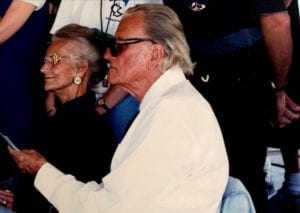
What’s Next?
GN – You’re the oldest of all the grandchildren. When’s the last time you were all together at one time?
ST – I can’t remember. Probably my grandmother’s funeral, which was eight years ago, I think. So because there’s 20 some grandchildren and they live all over the place, and they’re married and then they have their children, which are the great grandchildren, and now their children are having children, so they’re the great, great grandchildren, so it’s now a very large group. Its hard to even coordinate it. So there was my grandmother’s funeral about eight years ago, and obviously, in the next week or so we’ll see a lot of each other.
GN – People say when one person leaves that position of basically being God’s ambassador, we’re looking at who is God going to raise up next? Do you feel like, is there a pressure within the family about is someone going to rise up and replace that? Is that role being filled? Is there a thought about that?
ST – That’s a great question and I would answer that in two ways. On a practical level with the specific as it relates to the Billy Graham organization itself, my Uncle Franklin who runs Samaritan’s Purse, is also the head of the Billy Graham Association and has been for the past 15 years. And so even though my grandfather has been that legacy founder, from a day to day active role of running the organization, my uncle has done that. Now he’s obviously sought my grandfather’s advice and counsel and input, but Franklin has been acting as the lead. And then they have Franklin’s oldest son, my cousin Will; Will Graham works with the organization and has been doing some meetings on his own and those kinds of things. So time will tell if he’s really that person to be groomed to, in a sense, run the organization. Obviously those are decisions they’ll be making, the board will be making, those kinds of things as to what’s the future of the Billy Graham organization. And they also play a large role in training. So they train global pastors and preachers on a regular basis, which really leads to my second point. If you ever asked Billy Graham, “Who’s the next Billy Graham?” He would say, “You are.” In other words, it’s not always about a single individual. This is a unique time in history, and there was a very unique situation, but he would say that each one, the local pastors the missionaries, the businessman, the business woman, the housewife, the teacher, the first responder, that those men and women that love Christ. In essence you have the same call on your life in whatever field you’ve been called as I have in the field that I’ve been called. And I’ve always loved that answer because it really creates a sense of ownership. In other words, I’m no longer a spectator just watching this amazing creature, even though there’s elements of that. I know for me I will never be what he was or is, but I have a role and responsibility in the platform God has given me, and so do you. So I just think there’s a wonderful application in that whole process.
GN – What’s going to happen to the property? What is it The Cove at the top of the mountain so to speak? The home?
ST – So there’s a private home that he lives in. I don’t know yet exactly what will happen to that. My guess is it will remain in the family and they’ll probably have to figure out what they’re going to do with it. If it’s something they can use and enjoy for holidays or something, or will it somehow be turned into some sort of museum or something? I don’t know. And then about 15 minutes away is The Cove. The Cove is an active retreat conference center that is functioning and will continue to function as part of the organization, and then their corporate offices are down in Charlotte, North Carolina, and again that will continue to function as it has as far as I’m concerned. But his personal, he only owned one home. It’s not like he had all these tremendous assets all over the place. My guess is that will remain, for now, in the family.
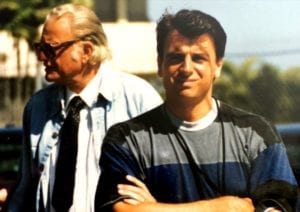
GN – Do you ever recall a time when he sat down with you and gave you a nugget of advice that you hold onto in specific?
ST – It came more in drips. There was never this moment where he said, “Ok I have to have a real serious conversation with you and here are the four secrets to life.” It wasn’t that. It was more here are the little drips, here, here, and here. In other words, I remember having lunch with him and asking him questions about certain things, about the Bible or maybe about something I didn’t understand, and he would give me an answer. I think the most profound answer he’s ever given me on some of the more complex questions I would ask him was, “I don’t know,” which I really loved because it said to me, “You can live a life of faith and live as a follower of Christ and not have to figure it all out.” It’s so freeing because most of us get freaked out because we don’t have answers for everything. So for him to go, “I don’t know.” OK, if you don’t know, I guess it’s ok not to know. And the one-on-one little conversations, it was really more observing life, observing him do life versus some profound statement. And then we often overlook my grandmother, who was really the rock in his life. And I have specific memories of her, but again, it wasn’t really just sitting down and saying, “Son ,I want you to know these things,” but it was more listening to her, watching her, asking her questions and it becomes a mosaic of one’s life. This portfolio of behavior and lifestyle and comment that adds up to this beautiful mosaic.
GN – Close your eyes, think of your grandfather. What do you see?
ST – I see a gracious, gentle, strong, courageous, determined, lover of Jesus with white hair.
Some Week…
GN – This has been some week. (The 17 murdered at Marjory Stoneman Douglas High School) Do you draw any connection or thoughts on that.
ST – It has been some week. I think the interesting thing is we see the epitome of brokenness and then we see the sense of hope. The best and the worst. You sort of saw both extremes. My grandfather has always preached that we are lost unless we have a faith in Christ and that God loves us. I remember one time Billy Graham was asked, “If we did a billboard, what would be one thing we should put on the billboard?” And I remember him saying to them, “All I would say is I love you. I love you. I love you – God.” So one of their billboards is, “I love you. I love you. I love you – God” and that’s a direct quote from Billy Graham. That’s such a simple message. It doesn’t get into the racial issues. It doesn’t get into the transgender issues. It doesn’t. He just says, “God loves you. He loves you. He loves you.” And sort of repeat. And what I find so interesting is that what we saw the week before was not just a simple manifestation of evil, but across the board we saw brokenness. The shooter, completely broken person, the lives broken as a result of his evil behavior, the system breaking down, you know, vicious venomous words thrown around, a sense of hopelessness, a sense of despair, a sense of evil, a sense of what’s happened to our country, and I really actually believe that what my grandfather preached his entire life and lived his entire life is the antidote. In other words, if we would truly understand that we all… the Bible says we’ve all fallen short of the glory of God, that we need Christ. And then because I have Christ in me, it changes the way I live my life. There’s no special check the box. It’s just my life is different, and so I just sort of think it’s such an interesting picture of the evil, the sickness, the toxicity with the antidote. And I find it fascinating.
Final Thoughts
GN – Is there anything else you want to share with us?
ST – No, we appreciate what you’re doing. My grandfather’s life was all about the Good News, so we appreciate what you guys are doing.
Another side, another story…
Read Rob Hoskins thoughts on Billy Graham’s incredible legacy: goodnewsfl.org/billy-grahams-incredible-legacy/

Comments